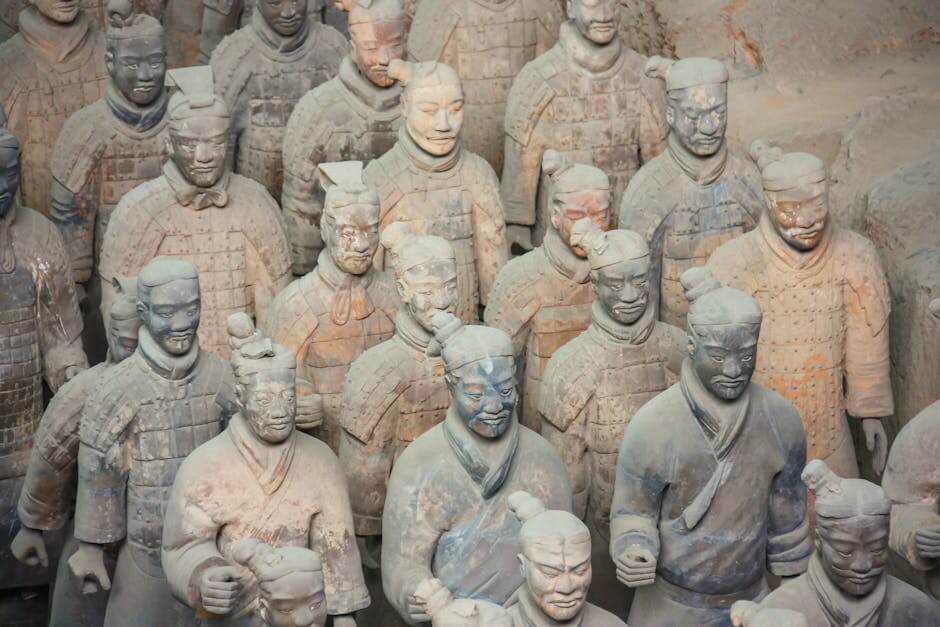Hey there, history explorers! 👋 Have you ever wondered about the amazing world of Ancient China? It’s like stepping into a time machine and discovering a civilization that’s both super old and incredibly influential. Even today, we see its impact all around us. From cool inventions to wise philosophies, Ancient China was a powerhouse of innovation and ideas.
This wasn’t just some small blip on the radar of history. We’re talking about a civilization that lasted for thousands of years! Dynasties rose and fell, each leaving its unique mark. Think of it like a giant, ongoing story with different chapters, each filled with epic adventures, brilliant minds, and sometimes, a bit of drama. 🎭 Ready to dive in and uncover some fascinating facts? Let’s go!
Ancient China Civilization: Key Takeaways
Alright, before we jump into the details, let’s get a quick overview. Think of this as the “trailer” before the main movie. These are the super important bits you should remember about Ancient China.
Here’s the gist:
- Ancient China was around for a really, really long time. We’re talking thousands of years, with different families, called dynasties, ruling.
- They were super inventors! Things like paper, the compass, gunpowder, and printing all came from Ancient China. Can you imagine a world without paper? 🧻
- Big ideas came from there, too. Philosophies like Confucianism and Taoism shaped how people thought about life, the universe, and everything.
Dynastic Cycles: The Rise and Fall of Empires
Okay, imagine a game of royal musical chairs. 🪑 In Ancient China, ruling families, or dynasties, would come to power, stay for a while, and then get replaced by a new one. This cycle happened over and over again. Why? Well, there was this idea called the “Mandate of Heaven.”
Basically, people believed that the gods gave the right to rule to a worthy family. If that family started acting badly, the gods would take away that right, and a new dynasty would take over. It was like a cosmic thumbs up 👍 or thumbs down 👎 for the rulers. This concept was a key feature of their political system. It’s a bit like having a boss who gets replaced if they’re not doing a good job, but on a much grander, divine scale.
Technological Marvels: Inventions that Changed the World
Get this – the Ancient Chinese were like the Silicon Valley of their time! They were constantly coming up with new inventions. Some of these inventions changed the world forever. For example, they invented paper, and that changed how people communicated and recorded information.
They also invented the compass, which helped people navigate the world. 🧭 And then there’s gunpowder, which initially was used for fireworks but later revolutionized warfare. Oh, and they invented printing, which made it easier to make books. It’s amazing how these inventions, born so long ago, still impact our lives today.
Philosophical Foundations: Confucianism, Taoism, and Legalism
Ancient China wasn’t just about cool gadgets. They were deep thinkers, too. Three major ways of thinking shaped their society: Confucianism, Taoism, and Legalism. They were a bit like different flavors of ice cream – each with its own unique taste and appeal.
Confucianism was all about being a good person and respecting your family and society. Taoism focused on living in harmony with nature. Legalism, on the other hand, was like a strict teacher, believing in strong laws and harsh punishments. These philosophies weren’t just abstract ideas; they influenced how people lived their daily lives, how the government worked, and even how art and literature developed.
Cradle of Civilization: The Dawn of Ancient China
Let’s rewind to the very beginning. ⏪ We’re talking way, way back, to the early days of Ancient China. This is where it all started, like the first chapter of a really long book. We’ll look at the Xia, Shang, and Zhou dynasties. They laid the foundation for everything that came after.
During this time, people started using bronze to make tools and weapons. They also developed writing, which is a pretty big deal. Imagine not being able to write anything down! These early dynasties were like the pioneers, setting the stage for the amazing civilization that would follow.
The Shang Dynasty: Oracle Bones and Bronze Age
The Shang Dynasty was one of the first major dynasties. They were around from about 1600 to 1046 BCE. One of the coolest things about the Shang is that they left behind written records on something called “oracle bones.” These were like ancient question-and-answer sessions with the spirits.
They would write questions on animal bones or turtle shells, heat them up, and then interpret the cracks that formed. It was their way of predicting the future. They were also amazing at working with bronze, creating beautiful and intricate objects. It’s like they were artists and fortune-tellers all rolled into one!
The Zhou Dynasty: Mandate of Heaven and Feudalism
Next up, we have the Zhou Dynasty, which lasted even longer than the Shang, from around 1046 to 256 BCE. They’re the ones who came up with the whole “Mandate of Heaven” idea we talked about earlier. Remember the divine thumbs up or down? 👍👎 That was their concept.
The Zhou also set up a system called feudalism. It was a bit like a pyramid scheme, but for government. The king was at the top, and he gave land to nobles in exchange for their loyalty and military service. These nobles then had their own people working the land. It was a way of organizing society and keeping control, but it also led to a lot of internal conflict later on.
The Qin Dynasty: Unification and the Great Wall
Fast forward a bit, and we arrive at the Qin Dynasty (221-206 BCE). This dynasty didn’t last very long, but boy, did they make an impact! The first Qin emperor, Qin Shi Huang, was a powerful and ambitious ruler. He’s the guy who unified China into a single empire.
Before him, China was divided into warring states. He brought them all under his control. He also started building the Great Wall of China. 🧱 It’s one of the most iconic structures in the world. Imagine a giant wall stretching for thousands of miles – that’s what he started! Here’s a video that tells you more about him: The First Emperor of China – Qin Shi Huang.
Legalism: The Philosophy of Qin’s Rule
Qin Shi Huang was a big fan of Legalism. Remember that strict teacher we talked about earlier? That’s Legalism in a nutshell. It was all about strong laws, harsh punishments, and absolute obedience to the ruler.
Qin Shi Huang used Legalism to keep everyone in line. He standardized laws, weights, measures, and even the writing system. It was his way of creating order and control. But it also made him quite unpopular with some people. He was a bit like a really strict principal who everyone was a little afraid of.
Terracotta Army: An Emperor’s Eternal Guard
Here’s something mind-blowing: Qin Shi Huang had a massive army of clay soldiers built to guard him in the afterlife! We’re talking about thousands of life-sized statues, each with unique details. It’s called the Terracotta Army, and it’s one of the most amazing archaeological discoveries ever.
Imagine walking into a giant underground chamber and finding yourself surrounded by thousands of clay soldiers, horses, and chariots. It’s like stepping back in time. This army was meant to protect the emperor in his tomb, showing just how powerful and important he was. It’s a testament to the incredible craftsmanship and resources of the Qin Dynasty.
The Han Dynasty: A Golden Age of Innovation
After the Qin, came the Han Dynasty (206 BCE – 220 CE). This period is often called a “golden age” for Ancient China. The Han emperors expanded the empire’s territory. They also made a lot of advancements in science, technology, and the arts.
It was during the Han Dynasty that the Silk Road really took off. This was a network of trade routes that connected China to the West. It was during this time that inventions really flourished. Paper was improved, making it easier to write and keep records. They made advancements in medicine, astronomy, and agriculture. It was like a period of great progress and prosperity.
The Silk Road: Connecting East and West
The Silk Road was like the ancient internet of trade and cultural exchange! 🌐 It wasn’t just one road but a whole network of them. They stretched across Asia, connecting China to places as far away as the Roman Empire. Goods like silk, spices, and tea traveled west, while things like glassware and horses came east.
But it wasn’t just about stuff. Ideas also traveled along the Silk Road. Buddhism, for example, spread from India to China along these routes. It was a time of great connection and exchange between different cultures. Imagine the stories those travelers must have had!
Society, Family, and Daily Life in Ancient China
So, what was it like to actually live in Ancient China? Well, it depended on who you were. Society was hierarchical, meaning there was a clear pecking order. The emperor was at the top, followed by nobles, officials, merchants, farmers, and artisans.
Family was super important. Respect for elders was a big deal. This is something called filial piety. Ancestor worship was also common, with families honoring their deceased relatives. Daily life varied depending on your social class. Farmers worked hard in the fields, while merchants traded goods. Artisans created beautiful objects. And the wealthy? They enjoyed a life of luxury.
Confucianism: Shaping Morality and Social Order
Let’s talk more about Confucianism. This philosophy, based on the teachings of Confucius (who lived around 551-479 BCE), was all about being a good person. It emphasized things like respect, kindness, and honesty.
Confucianism had a huge impact on Chinese society. It shaped the way people interacted with each other, the way the government was run, and even the education system. Schools focused on teaching Confucian principles. It was like a moral code that everyone was expected to follow.
Taoism: The Way of Nature and Harmony
Taoism (also spelled Daoism) is another important philosophy from Ancient China. It’s a bit more mystical than Confucianism. Taoism is all about living in harmony with nature, following the “Tao,” which is like the natural order of the universe.
Taoists believe in simplicity, spontaneity, and going with the flow. They often seek to live in accordance with nature’s rhythms. It’s a bit like being a surfer, riding the waves of life rather than fighting against them. 🏄♀️ Taoism also influenced Chinese art, medicine, and even martial arts.
The Enduring Legacy of Ancient China
Wow, we’ve covered a lot, haven’t we? From the early dynasties to the golden age of the Han, from amazing inventions to profound philosophies, Ancient China was a truly remarkable civilization. Its legacy continues to shape our world today.
Think about it: every time you write on paper, use a compass, or see fireworks, you’re experiencing a bit of Ancient Chinese innovation. Every time you encounter ideas about harmony with nature or respect for elders, you’re touching upon the philosophies that originated there. Ancient China’s contributions to technology, philosophy, art, and culture are undeniable.
Further Exploration: Delving Deeper into the Past
If this journey through time has sparked your curiosity, there’s so much more to discover! You can visit museums with Ancient Chinese artifacts, read books on specific dynasties or philosophies, or even watch documentaries that bring this fascinating period to life.
Here is another video you might like: Ancient China Explained in 13 Minutes. Remember, history is an ongoing adventure. There are always new things to learn, new perspectives to consider, and new connections to make. So keep exploring, keep questioning, and keep being amazed by the incredible story of Ancient China! ✨

